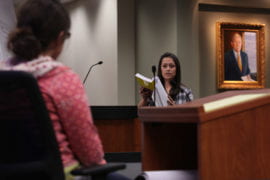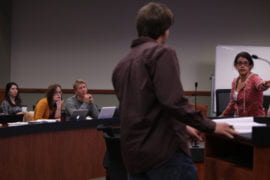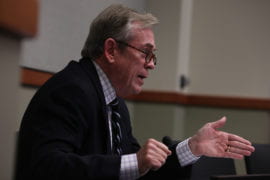Moot court is home to real cases
New law school venue lets students argue current legal issues in an authentic environment.
In the UC Irvine School of Law’s newly dedicated moot court classroom, students will soon argue thorny questions raised in the recent federal case Nasser al-Aulaqi v. Barack H. Obama: In short, can the U.S. government legally order the targeted assassination of a U.S. citizen abroad who’s deemed a terrorist threat to the nation? And does a father have any legal standing to contest such action to protect his son?
These are tough issues for second-year law students, but the Experian/Jones Day Moot Court Program seeks to provide real-world advocacy training – in a real-world environment. Named for an Orange County trial attorney and law school supporter, the Mark P. Robinson Jr. Courtroom is furnished with a judge’s bench, a jury box and attorney tables and is designed to help students hone their trial skills.
“We’ve always said that one of our focuses in this law school would be experiential learning,” says dean Erwin Chemerinsky. “We’re preparing our students for the practice of law at the highest levels of the profession, and having a state-of-the-art courtroom like this is truly essential.”
The plaintiff in Nasser al-Aulaqi v. Barack H. Obama – which was dismissed in December – was the father of a dual U.S.-Yemeni citizen hiding in Yemen who is believed to have ties to al-Qaida and has allegedly been targeted for assassination. The defendants were President Obama, Secretary of Defense Robert Gates and CIA Director Leon Panetta.
Students will choose which side they want to represent and argue their cases before a distinguished panel of judges in mid-February. The competition will culminate in a final round March 30.
“I can tell you that having the Robinson Courtroom makes the experience far more realistic than if we were doing the same work in a normal classroom,” says student Tracey Steele. “We have the opportunity to learn how to move around the courtroom while examining witnesses, to consider how our positioning can affect the perception of the jury and the witness.”
Students are also taking advantage of technology embedded in the courtroom. Each has had at least one opportunity to be videotaped while questioning a witness. The videotapes are then reviewed with the professor. Another taping session near the end of the semester will let students compare and see concrete improvement.
“I know that when we enter the oral argument phase of the moot court competition,” adds Steele, “having access to the Robinson Courtroom will be a major addition to the experience, in terms of making the simulation feel as ‘real’ as possible.”
Robinson, who teaches trial advocacy as an adjunct professor, was equally enthusiastic at the Jan. 10 dedication of the courtroom: “This organization is the beacon of legal education in the nation, and I’m proud to be part of it. This is a tremendous law school, and I want to do all I can to help it grow.”
- Christina Kazarian, right, plays the role of an attorney who is trying to prove her “client” is not guilty. Behind her, is the portrait of attorney Mark P. Robinson that was unveiled at the Jan. 10 dedication of the courtroom named after him. Michelle S. Kim / University Communications
- Jillian Cook, who is playing the role of Mrs. Fitzgerald shows the defending attorney played by Ryan Stauffer exactly where her purse with $400 inside was stolen.
- Mark Robinson Jr., who teaches a trial advocacy class for law students to practice their court skills, advises his students how to change their approach in questioning the witness.


